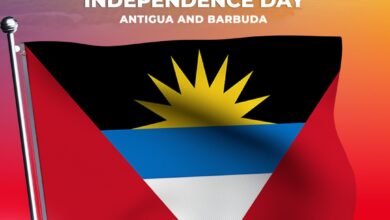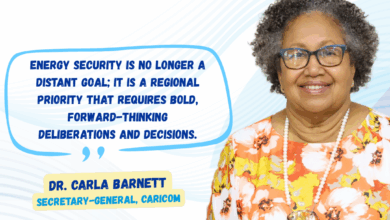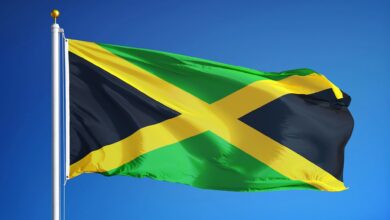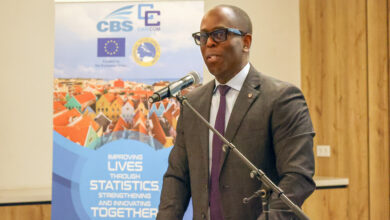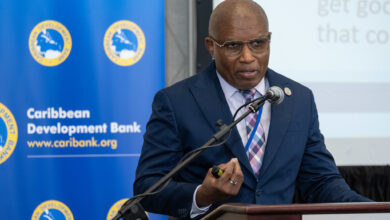The Honourable Dr. Kenneth Baugh, Chairman of the Council for Foreign and Community Relations (COFCOR);
The Honourable Bruce Golding, Prime Minister of Jamaica;
The Honourable Baldwin Spencer, Prime Minister of Antigua and Barbuda and Outgoing Chairman of COFCOR;
Honourable Foreign Ministers;
Members of Parliament;
US Assistant Secretary of State, Mr. Tom Shannon;
Ambassador Albert Ramdin, Assistant Secretary-General of the OAS and other members of the Diplomatic Corps;
Assistant Secretary-General Colin Granderson, Foreign and Community Relations, Caribbean Community;
Senior Officials of the Government of Jamaica and of other member states of the Community;
Other Distinguished Delegates;
Distinguished Guests;
Representatives of the Media;
Ladies and Gentlemen
As always it is a great pleasure for me to be here in Jamaica. This is the land where, as a student of the University of the West Indies (UWI) at the Mona Campus, the seed for my Caribbeanness was planted and where my regionalism was born. From that time until now, I have remained an unrepentant regionalist, a position that not even the travails of being Secretary-General of the Caribbean Community have been daunting enough for me to disavow.
Indeed, the almost three decades of my life that have been devoted to contributing in various capacities to the building of a united Caribbean as a means of providing a viable, prosperous and sustainable life for the people of this Region have strengthened my conviction that economic integration, functional cooperation, security and foreign policy co-ordination are the true pillars upon which an integrated Caribbean Community must stand.
Mr. Chairman, Honourable Ministers, Ladies and Gentlemen in today’s world of creaking international architecture and systems, rapidly changing interests and priorities of the major powers, instant global crises and the increasing assertiveness of the emerging nations, foreign policy co-ordination among the Member States of the Caribbean Community assumes an almost overriding pre-eminence among the four pillars of the Community. It is the one that could provide this grouping of small, vulnerable nation states with both the sword and the shield as it seeks to carve out, protect and eventually broaden its space on the global field with a resulting positive effect on the lives of the people of the Community.
To help achieve those objectives, it is this Council for Foreign and Community Relations (COFCOR) that has been entrusted by the Revised Treaty of Chaguaramas with the responsibility set out in Article 16, and I quote “for determining relations between the Community and international organisations and Third States,” and further “to establish measures to co-ordinate the foreign policies of the Member States of the Community policy, including proposals for joint representation and to seek to ensure, as far as practicable, the adoption of Community positions on major hemispheric and international issues.”
Indeed, it can be argued that it is the fulfilment of those responsibilities that most definitively stamp us as a Community. Therefore, in determining relationships and adopting positions, this Council must arrive at a collective position which, in its judgement, advances as well as protects the interests of the Community. In arriving at that collective position, this Council should, of course, be guided by where we are in the process of economic integration, what we need to strengthen the modes of our functional co-operation and by how best to ensure our security.
Seeking the Community’s interests with Third States and International Organisations, therefore, requires knowledge and understanding of the policies guiding the entire spectrum of the integration process. It calls as well for an understanding by individual Member States that the exercise of their sovereign rights, at the very least, should not jeopardise the interests of the whole.
Undoubtedly, in the pursuit of legitimate national goals, there can be occasions when certain national and Community interests might appear to be in conflict. This is not unusual in any integration movement and in itself may not be a cause for concern. Let it be clear, however, that it is imperative that in the Community’s interests, care must be exercised to ensure that what may be short-term gain for one does not evolve into long-term loss for all.
Thus the Community, – our Community – must normally at all times be consulted, and when not possible, at least be apprised, with respect to those positions being pursued by member states, which might affect the broader Community interests. This is the spirit of Article 80 of the Revised Treaty of Chaguaramas, which must always be adhered to.
Honourable Ministers, as we are all aware, these are trying times globally. They are particularly so for small, vulnerable developing countries like ours of the Caribbean Community. But, as the Prime Minister of Trinidad and Tobago noted in the context of the recently concluded Fifth Summit of the Americas: “The Summit has comprehensively demonstrated that together the Region can be a force on the international stage.” Given the current global, political, economic and financial circumstances, the need has never been greater for us as a Community to maintain our integrity as a Unit as we seek to build a common future.
Mr. Chairman, Honourable Ministers, Ladies and Gentlemen, there is another dimension to this collectivity of common interest that deserves closer consideration. Article 16 (3a) of the Revised Treaty of Chaguaramas states that COFCOR shall: “promote the development of friendly and mutually beneficial relations among the Member States.” This promotion of “mutually beneficial relations”, thereby assisting individual Member States, can serve to minimise any threat to our coordinated positions as a Community. In that process, this Council has a leading role to play and to do so by ensuring that the gains of integration are equitably shared. We are, therefore, each not only our brother’s keeper but also promoters of his welfare.
Thus, as we widen the circle of involvement whether as individual nations or as a Community, the guiding principle must be the preservation of our unity – a unity that has allowed CARICOM when it speaks with one voice to exert an influence that exceeds that of the sum of its constituent parts. This has been no mean feat over the past 36 years. In doing so, we have managed by and large to overcome the challenge of geography, inherent in our spacial distinctive individuality created in large measure by the Caribbean Sea which separates but also unites us.
Mr. Chairman, Honourable Ministers, distinguished delegates, over the next two days you would be addressing a diverse and complex range of issues that are among today’s most critical global challenges. These include but are not limited to the global economic and financial crisis, climate change, security and the geopolitical trends that are reshaping the world. You would also be taking the pulse of the quality of our relationships with our neighbouring states and external partners as well as with the regional and international organisations to which we belong.
No less critical however, are a number of special issues of purely regional interest which are also of great importance. I have a confidence, born of my many years of experience, that when we rise tomorrow, this Council would have adequately dealt with all those issues. You would have done so, substantially aided by the splendid arrangements put in place for this Meeting, by the Government and people of Jamaica, who have maintained their well-earned reputation for warm and generous hospitality, for which we express our deep appreciation. Finally, Ladies and Gentlemen, as you go forward, the importance of the contribution of foreign policy coordination to the overall development strategy of the Region must always be uppermost in your mind. With a combined population of less than some major cities, the danger of marginalisation of our interests in the global arena is real, even as a group.
It is, and must therefore, always be an imperative of our integration movement that we strengthen our foreign policy coordination to ensure that in a world of shifting balance of political and economic powers, CARICOM’S voice continues to be heard, as we seek to provide a viable, prosperous, secure and sustainable Community for All.
Mr. Chairman, Honourable Ministers, Ladies and Gentlemen, I thank you for your attention.

